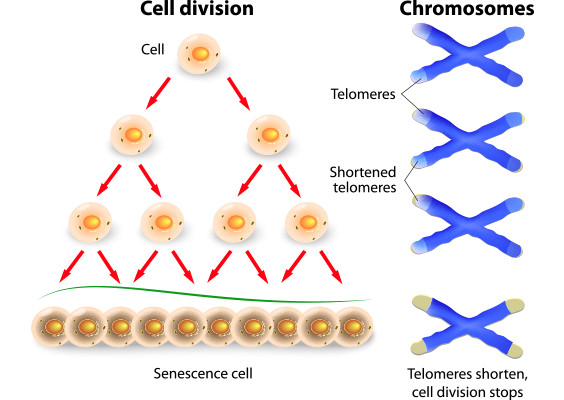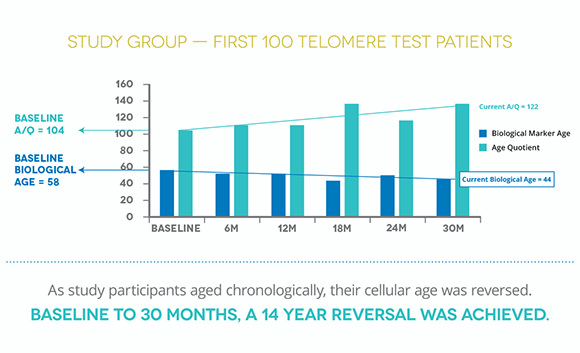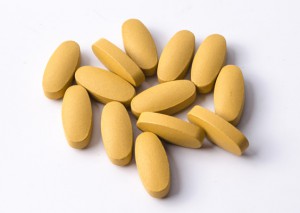
I’ve been getting a lot of mail from readers asking a similar question. Most are like this one from MK in Philadelphia: “I’m going for an annual checkup with my doctor soon. I want to make sure I’m getting the right tests. What’s the number one anti-aging test I should ask my doctor for?”
It’s a great question. The problem is your local doctor has probably never even heard of the top anti-aging test I recommend.
You see, I want to know what’s going on with you at the cellular level. And that’s why I think it’s essential to measure your telomeres.
Telomeres are an important part of human cells that affect how our cells age.
You know by now telomeres are the protective caps at the end of each strand of DNA. When you are young your telomeres are long. But every time a cell divides the telomeres get shorter.

Over time, your telomeres get so short they can’t protect your DNA as well. When a cell divides, new cells are defective. You begin to develop the signs and diseases of old age.
Short telomeres dramatically boost your risk of serious diseases. They’ve been linked to a 300% increased rate of death from heart disease. They’re also linked to an 800% higher death rate from infectious diseases.1
By measuring your telomeres, I can tell your true “biological age.” Telomere length is the strongest indicator of how quickly you’re aging and how old you really are.
So let’s say you’re tested when you’re 60 years old. It takes four to six weeks to get the results. I might see from your test results that you have a biological age of someone who’s 64. In other words, you’re aging faster than you should be.
One thing I would do right away
is give you a plan to turn on telomerase.If you’re a regular reader, you know telomerase is the enzyme that rebuilds your telomeres. When you turn it on, your telomeres gradually get longer. It slows down your aging. Your body starts creating younger and younger cells.
The next time I test your telomeres, they should be longer. I can show you on a graph how much younger your biological age is.
I use a telomere test from a company called Life Length. Their Telomere Analysis Technology (TAT) was developed by Dr. Maria Blasco, one of the leading telomere researchers in the world.
TAT is the best telomere test on the market. And it’s been proven accurate in clinical studies.2
Most labs can only measure “average telomere length.” Average length is good to know, but it’s not the whole story.
You see, each cell in your body has 92 telomeres. Some may have a healthy length. Others may be in trouble. Only the TAT test tells you how many “critically short” telomeres you have.
“Critically short” means that 70% to 80% of the telomere has already eroded away.
Those are the ones that can cause permanent cell damage.
When telomeres become critically short they activate the p53 gene. That gene gives the signal for the cell to go into emergency shutdown. The cell stops growing or dividing. Energy production plummets. Antioxidant activity drops. Free radicals attack and more telomeres become critically short.
As Harvard researchers explained, critically short telomeres can set in motion a “death spiral.”3
That’s why it’s so important to get a handle on the length of your telomeres. By getting your telomere length tested, you can be in control of your health and your life.

When I tested a group of my own patients, their average biological age was 58 years old. Then I put them on a protocol designed to activate their telomerase enzyme.
After 30 months the average age of the group dropped 14 years to 44 years old. I’ve seen some individuals reverse their biological age by 20 to 30 years!
If you would like to have your telomere length tested here at my Sears Institute for Anti-Aging Medicine in South Florida, please call us at 561-784-7852 and make an appointment today.
Even if you can’t get your telomeres tested, you can still protect them. Poor diet, lack of exercise, or stress can all accelerate wear and tear on your countdown clocks.
In as little as a year you can modify the length of your telomeres with some simple changes to your routine.
Here’s what you can do right now to activate telomerase and grow your telomeres.
- Eat More Fruits and Vegetables. Diets lower in refined carbohydrates and higher in fresh fruits and vegetables are linked to longer telomeres.

Eating more magnesium-rich foods like leafy greens is linked to longer telomeres. The magnesium preserves and repairs DNA. Boost your magnesium levels by eating more kale, spinach, Swiss chard and seaweed. Other good choices include quinoa, lentils, almonds, sesame seeds, avocado, spirulina, and dark chocolate.
- Exercise. Studies show people who do little or no exercise have the highest risk of short telomeres. A study of 2,401 twins found vigorous exercise can lead to telomeres that act nine years younger.

My PACE exercise program is the only system that specifically addresses the challenges of aging. It lets you get just the right amount of exertion to give you anti-aging benefits. And it takes as little as 12 minutes per day.
- Reduce Your Stress. I often recommend meditation to my patients. It’s one of the best ways to reduce stress. And it can also turn on telomerase activity. In one study of 39 caregivers, half listened to “relaxation” music. The other half practiced meditation for just 12 minutes a day. After only eight weeks, telomerase activity in the meditation group jumped 43%. The relaxation group went up a measly 3.7%.

- Raise Your HDL Levels. One of the best ways to maintain your telomeres is simply raise your HDL cholesterol as high as you can. In one study, people with the highest HDL had the longest telomeres.
An easy way to raise your HDL is to take a special form of vitamin E called tocotrienols. Vitamin E is actually a group of eight nutrients, four tocopherols, and four tocotrienols. Studies show that tocotrienols give your HDL a huge boost. Look for a tocotrienol supplement with as much gamma and delta tocotrienols as you can.

- Boost Your Folic Acid. Folate or folic acid is one of the B vitamins. Studies show men with the highest folic acid levels have longer telomeres than those with low folate.
Folate works by counteracting the effects of the amino acid homocysteine. High levels of homocysteine in your blood can triple the speed at which your telomeres shorten.
I recommend getting 800 mcg of folic acid every day for your telomeres. Calf’s liver is one of the richest sources with 215 mcg in just three ounces. Dairy, poultry, meat, eggs, and seafood are other good choices. Among vegetables, dark leafy greens are a good source. Try spinach, broccoli, asparagus and Brussels sprouts.

You can also take a folic acid supplement. But don’t overdo it. Too much folic acid can hide the symptoms of a vitamin B12 deficiency.
- Take a Potent Antioxidant. Raising the level of vitamin C in your cells could slow down the shortening of telomeres up to 62%.One study showed that vitamin C also stimulated telomerase activity in the formation and regeneration of stem cells.

To help reverse aging, I recommend taking 5,000 mg to 8,000 mg every day. Be sure to divide that amount into multiple smaller doses throughout the day.
For more information, call the Sears Institute for Anti-Aging Medicine at 561-784-7852 or visit www.searsinstitute.com.
To Your Good Health,

Al Sears, MD, CNS
1Cawthon, R.M., Smith, K.R., O’Brien, E., et al, “Association between telomere length in blood and mortality in people aged 60 years or older,” Lancet 2003, 361(9355):393-395.
2Canela A, Vera E, Klatt P, Blasco MA. “High-throughput telomere length quantification by FISH and its application to human population studies.” Proc Natl Acad Sci U S A. 2007;104(13):5300-5.
3Sahin E, Colla S, Liesa M et al. “Telomere dysfunction induces metabolic and mitochondrial compromise.” Nature 2011;470:359-65.
4Mirabello L et al. “The association between leukocyte telomere length and cigarette smoking, dietary and physical variables, and risk of prostate cancer.” Aging Cell. 2009;8:405–413
5Xu Q, Parks CG, DeRoo LA, Cawthon RM, Sandler DP, Chen H. “Multivitamin use and telomere length in women.” Am J Clin Nutr. 2009;89:1857–1863
6Krauss J, Farzaneh-Far R, Puterman E, Na B, Lin J, Epel E, Blackburn E, Whooley M. “Physical fitness and telomere length in patients with coronary heart disease: findings from the Heart and Soul Study.” PLoS One. 2011;6(11):e26983.
7Cherkas L, Hunkin J, Kato B, Richards J, et al. “The association between physical activity in leisure time and leukocyte telomere length.” Arch Intern Med. 2008;168(2):154-8.
8Lavretsky H, Blackburn E, Irwin M, et. al. “A pilot study of yogic meditation … effects on mental health, cognition, and telomerase activity.” Int J Geriatr Psychiatry. 2013;28(1):57-65.
9Dei Cas A. et. al. “…cardiovascular disease and reduced HDL-cholesterol levels are associated with shorter leukocyte telomere length…” Nutr Metab Cardiovasc Dis. 2013;23(3):272-8.
10Hunninghake, et al, “Incorporation of lean red meat into a National Cholesterol Education Program Step I Diet,” Journal of the American College of Nutrition 2000;19(3):351-360.
11Paul L et al, “Telomere length in peripheral blood mononuclear cells is associated with folate status in men.” J Nutr. 2009;139(7):1273-8.
12Richards J et al. “Homocysteine levels and leukocyte telomere length.” Atherosclerosis. 2008;200(2):271-7.
13Ibid.
14Furumoto K. et al. “Age-dependent telomere shortening is slowed down by enrichment of intracellular vitamin C via suppression of oxidative stress.” Life Science 1998, vol. 63, no. 11 pp. 935-48.
15Wei, F. “Vitamin C treatment promotes mesenchymal stem cell sheet formation and tissue regeneration by elevating telomerase activity.” J. Cell Physiol. Sept. 2012; 227 (9): 3216-24.

